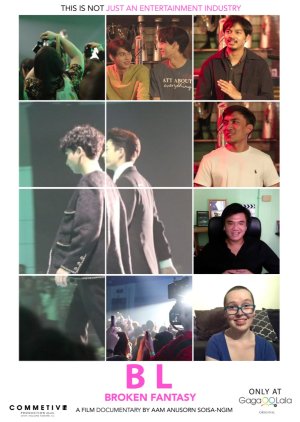
I think we're still waiting for the documentary that shows such things as how a BL series comes together, how its impact and popularity are tracked and leveraged, and the whole concept of shipping, including how the shipping of BL actors in real life can impact those real lives.
I'm also curious how the actors who are part of a BL pairing are paired in the first place, how they're instructed to behave off camera, and whether the production companies go so far as to put stipulations in their contracts about it. For me this would show whether the people in charge wish to exploit the blurred perception of on-screen couples with the belief that they're actually dating.
This becomes an even bigger concern with underage actors. What do their parents have to say about how and why they got their boys involved in BL, and once production starts how are the interests of these young actors protected?
So, in short, given the documentary's provocative title I was hoping for a deeper dive that took some risks and spoke truth to power. What we got instead is a wade through the shallow end of the pool that will be more rewarding for beginner fans of BL.
If you'd already heard of this documentary then you probably know that Bright and Win are featured in one of the segments. For me they seem like an odd choice of actors to interview regarding how they approached their roles, since their '2gether' franchise is the subject of some debate over whether it's truly BL or actually a bromance. As actors they haven't (yet) been asked to kiss romantically on screen or even be shown cuddling shirtless in bed -- something that the documentary director's own films haven't shied away from. Why not talk to actors who actually *have* had to do such things on camera, and ask what their experiences were like? (And tell us what went on behind the scenes at '2gether' that resulted in all the guard rails being put up ....)
It makes me wonder if Bright and Win were the only actors available or were selected due to '2gether's' current popularity. (One thing for sure: their presence is being used to promote the film.) So many other BL couples would have been a better pick due to their longtime experience in the business: OffGun, KristSingto, TayNew, PeakBoom, or even the cast of '2 Moons 2', a series that the documentary director himself directed.
(I'm sure that Ohm Pawat and Toey Sittiwat would also have had some interesting things to say.)
So, this film is good enough for what it does but isn't quite the documentary the title promises it to be. I hope the director will consider making a 'Part 2'.
Was this review helpful to you?
Too shallow
First of all a big applause to the director for even opening the themes about the problems of BL industry. That definitely needed courage. Sadly the documentary stays too shallow, not really addressing the problems, not really going into any depth at all. I have no idea why are here Bright and Win, their answers are definitely scripted, so their contribution is actually zero. But there are probably not many active BL actors willing to talk about their industry and its problems. I would pay a lot of money to hear the real answers of such legends as Max and Tul, or Mew (who can definitely tell a lot of nasty stories) or Saint etc.. But of course that is just wishful thinking. But the director could talk about other problems - fanservice, stereotypes in bl works etc etc, but he did not.Was this review helpful to you?
This review may contain spoilers
Cautious reflections from Thai filmmakers // Diplomatic prequel to Call It What You Want
The documentary offers 20 minutes of intelligent, cautious reflections from several Thai filmmakers, who work with BL projects, apart from directing "normal" series, films, ads. The biggest input is from the director of this documentary, who appears genuinly thinking out loud, without delving into what the BL community would like or expect or hate to hear. Is it intended for the BL fan community at all? Not necessarily. An introduction to the BL genre for everyone else? Not sure. The filmmakers' cautious public reflection on BL series from a subtle, ambivalent, yet somewhat sympathetic viewpoint on the genre, which - it's not stated directly, but palpable - is treated as inferior within the Thai filming industry? Most likely.If you, like me, prefer to just watch BL, without following the social media backstage of the BL industry with its dramas and gossips, this documentary is not too hot, not too cold: politely and superficially it covers many topics, without uncovering anything disturbing too deeply (occasional BL tendency to romanticize and normalize sexual assault is disturbing even being mentioned briefly).
Some observations from the documentary which were of interest for me as an international (non-Asian) viewer:
1) In the Thai soaps industry, BL series are apparently referred to as yaoi series. I'm not an expert in both yaoi and BL, but I thought they are different. What gives BL a much broader appeal, is a happy end becoming the norm. BL is expected to be a feel good story. It wasn't the case with a gloomy, sad yaoi. Thus, even though Thailand is internationally regarded as the kingdom of BL, the local filming industry apparently prefers to see it as a foreign, yaoi-inspired phenomenon?
2) Some of Thai filming crew could openly express their aversion while filming a kissing scene between male actors in BL. A glimpse into a bitter reality behind an idealized acceptance attitude in the average BL.
3) Thai BL productions experienced a rise in demand after the pandemic. Seems understandable. The director noted BL is all about a highly idealized unrealistic romance between men, often adopted from stories written by women, for women. People must be eager to escape to a perfect fantasy world at the time of the unprecedented pandemic restrictions. Also, Thai BL series reportedly attract many advertisers. Good to know for the international audience, it means the genre is viable and thriving, more BLs to come. For me, it's amazing that BL stories are perceived more or less similar all over the world, while the advertisements they feature seem to be much more representative of the local culture.
4) The documentary's featuring a Thai LGBT group probably makes a case for BL being an ally or representation of the real people with a real cause. But, I wonder, being mostly a straight women's fantasy, aimed for female audience, how could BL be representative of real men's experiences? If I got it right, two of the featured directors actually think it could be eventually possible, either because it doesn't matter what label is applied to the relationship between two people in love (Call It What You Want) or by gradually challenging and changing the unrealistic or dated patriarchal BL tropes and clichés from within (Bad Buddy).
5) The fans who contributed to the documentary created an impression of a more mature, level-headed audience than the vibe from the average BL social media discussion in English.
As for actors, the director expresses his concern for the restrictions these fan-shipped BL actors face in real life. Surely, it puts tonns of extra pressure, but it seems like every social media personality nowadays walks on thin ice when it comes to what they say, post, endorse; or what their fans do. Some of the restrictions, specific for fan-shipped BL actors are mentioned in detail in the director's 2021 series, Call It What You Want. It seems like in the fictional settings Thai BL series and films tend to be more openly reflective, ironical and sarcastic about different questionable aspects of the BL subculture than in a documentary framework.
6) If same-sex marriages were legal in Thailand, BL wouldn't be so popular? I couldn't know, but not sure about this opinion from the documentary. If BL is driven by straight women shipping straight or undisclosed male characters in fiction and in reality, it could be not related to the legal status of same-sex relationships in reality. Is BL not popular in Taiwan or in the West?
At the end of the day, one should be able to sleep well after having watched the documentary (if they are not into reading between the lines). And maybe the filmmaker feels towards the BL genre a little bit more sympathetic than the title implies, and probably out of this good intention the documentary prefers the topic to fly safely under the public scrutiny radar. Or maybe not. The documentary has an open ending, viewers are invited to think on their own.
My takeaway from the documentary and the subsequent series, CIWYW, is that I liked this attempt to look at the BL genre from a wider perspective, as they say in English, to think outside the box. Not being engaged in this (vicious?) circle of passionate shipping fans, blurring lines between fiction and reality; the industry management, tapping into the fans' expectations and flirting with them in order to monetize their addiction; this artificial BL genre, which originally doesn't reflect real men's experience, but mostly catered for straight women fantasy of an ideal romance between mostly straight men who happen to fall in love with each other, out of any realistic proportion, - and this is thought to represent the LGBT people for some reason; clichéd BL plots, depicting innocent romantic nonsense, stereotypical roles, derived from patriarchal experience of the past or sometimes disturbing sexual violence; all acted out by young actors, trying to make it in the industry, whatever it takes.
With all this mess in mind, known even without this documentary or the subsequent series, I like the simple reminder that there's a life besides BL. And will probably stay divided on BL as before watching it. Deep down, I would like to believe that BL is a feel good idealistic story, giving voice and public support to the universal idea of a more inclusive society, but this genre brings in its own inherent restrictions and divisions, capable of exploitation and misrepresentation of real people. All in all, I second one the previous reviewers, respect to the documentary for starting a public discussion on this subject, which many people all over the world are passionate about.
Was this review helpful to you?

More of an outline than a full documentary
Put simply, it's an outline of a BL industry documentary. Lots of relevant points were brought up, but in such a brief and unspecific way that only really early newcomers might see as useful.Topics included:
- History and rise of Yaoi, Y series, and BL
- Fan club opinions of the appeal of BL series
- Popularity in the novelty of the illegal
- Romanticized and normalized portrayal of sexual harassment and rape in BL
- Homophobia among BL crew members during film shootings (apparently some may have turned around and puked afterwards)
- The separation of actor and character when filming
- How controlling the industry is over the actors
- How some activism needs to stay backstage in order to avoid collateral damage to the actors
- Shipping culture and the tendency to see characters (and by extension, the actors/idols that play them) as their metaphoric children
- BL actors' activism and presence in society
I suppose this information could prompt curiosity in newcomers, but the trick would be to get it in front of them.
I did however enjoy seeing cameos and interviews from some familiar faces, as well as several clips and references to shows and headlines I remembered or missed.
I do think that another documentary should be done on this topic - to elaborate on the topics, give more testimony, and (no hate intended) find better fan club spokespersons (it's not that they particularly said anything wrong, it's just that they really didn't add much to the conversation - despite being in an excellent position to do so).
Was this review helpful to you?

 1
1
























